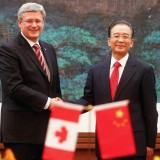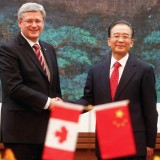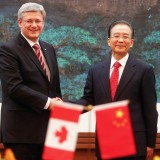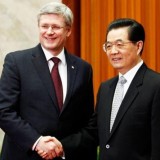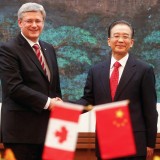CBC’s Power and Politics has chosen “energy politics” as the top Canadian news story for 2012 and we at the Common Sense Canadian couldn’t agree more.
Energy is the current which runs through a diverse array of issues presently reshaping our country – from omnibus budget bills that have slashed environmental regulations, to foreign trade deals, changes to our labour rules and, perhaps most significantly, the growing mobilization of First Nations, supported by non-aboriginal Canadians, to oppose many of these initiatives.
2012 was a year that began with Conservative Natural Resources Minister Joe Oliver dismissing opponents of the proposed Enbridge Northern Gateway pipelines as “radicals” and ends with the Idle No More rallies sweeping the nation – with support coming in from as far away as Buckingham Palace (or just outside its gates, anyway).
It was a year when two very different visions for the future of Canada and its place in the world collided headlong with each other. One seeking to curb the Tar Sands and new arteries essential to its growth, the other striving to make Canada into a new Saudi Arabia – provider of oil, gas and coal to emerging Asian markets.
Each policy piece from the Harper Government was part of a bigger puzzle, designed to bring its new vision to fruition.
There was the first omnibus budget bill, C-38, which gutted the Fisheries Act, watered down environmental assessment processes and slashed ministry staff in monitoring and regulation. The Common Sense Canadian published retired senior DFO scientist and manager Otto Langer’s first warning of these intended changes to the Fisheries Act, which unleashed a media firestorm and spate of denials from senior Harperites.
We also published the sad farewell letter from one of the world’s top marine pollution experts, Dr. Peter Ross, who lost his job when the Harper Government essentially canned our entire ocean monitoring program. Even one of the world’s top monitoring stations for climate change and arctic ice melt, PEARL, could not escape this government’s ax (for a savings of a whopping million and a half a year).
Clearly, these changes grew out of and helped to further a “see no evil, hear no evil” approach to climate science that is critical to the Harper Government’s hydrocarbon expansion agenda – which also demanded the smoothing of those pesky regulatory hurdles for resource project development.
But one of the Harper Government’s pet projects, the Northern Gateway pipeline, made defending its agenda more challenging, with an unrivaled string of public embarrassments. There was the damning US report on the company’s 2010 disaster in Michigan, then more spills in Canada, a badly bungled PR campaign, the infamous “missing islands”, and repeated blunders at the National Energy Board hearings into its proposal.
Yet, even with these public blemishes on the star of its new energy vision and with mounting evidence of catastrophic, fossil fuel-driven climate change, the Harper Government’s attitude remained unchanged, especially on the international stage. In 2012, we became the first country to formally pull out of the Kyoto Protocol (not that we ever took our commitments serious in the first place). At the same time, Canada was caught by the Guardian, through a leaked memo, working to block a resolution to end to public subsidies for fossil fuels at the Rio+20 summit.
Back in Ottawa, the latest omnibus budget, C-45, picked up where its predecessor left off, slashing the age-old Navigable Waters Protection Act – one of the main beefs of the Idle No More movement.
Provincially, energy politics have dominated the agenda too – from the well-publicized spat between BC Premier Christy Clark and Alberta Premier Alison Redford over revenue sharing from the proposed Enbridge pipeline, to Redford’s new alliance with Quebec Premier Pauline Marois over alternate plans to move bitumen East.
The media and public discourse in BC was particularly infused with with energy – beginning with the NDP and Liberals jostling for positioning on Enbridge, to the emergence of KinderMorgan’s proposed pipeline and tanker expansion for Vancouver as a major urban issue in the lead-up to next May’s election. Add to that natural gas fracking, proposed pipelines and the plan to build multiple Liquified Natural Gas (LNG) terminals on the coast – all of which are increasingly on the media and public’s radar and sure to be election topics. The movement against the proposed Site C Dam, which would power gas and mining operations, is building momentum too.
The NDP has been all over the map on these issues, initially getting behind fracking, new pipelines and LNG plants with few reservations, then, recently, showing signs of feeling some of the public pressure building around these issues. This was evidenced by an op-ed in the Georgia Straight, co-penned by Energy Critic John Horgan and Environment Critic Rob Flemming, promising “a broad public review of fracking” and “immediate changes to protect B.C.’s water resources”.
The party appears caught between the growing concerns about fracking and LNG and a desire not to appear to be too “anti-business” or ignore an opportunity to reboot the BC industry and close the budget gap with increased royalties and related revenues. It will be very interesting to see where the NDP goes on this file in 2013.
Christy Clark, for her part, has left no doubt about her bullish outlook for natural gas and LNG, comparing BC’s potential with this resource to Alberta’s Tar Sands. Some of the nation’s top independent energy experts have poked big holes in Clark’s plan, though, suggesting that her numbers simply don’t add up.
Federally, the NDP’s selection of Thomas Mulcair shook up the political scene and energy debate. Unlike Harper’s former Liberal Opposition challengers, Mulcair seemed to have a firm grasp of energy and economic issues and was prepared to take on Harper on topics others would shy away from.
Take Mulcair’s rendering of the “Dutch Disease” into a Canadian household term. The concept, supported by the OECD and other highly reputable economic institutions and economists, holds that the downside of a petro-state economy is artificial currency inflation, which leads to the hollowing of a nation’s manufacturing sector. New jobs in Fort MacMurray mean layoffs in Hamilton. The fact Mulcair was able to get the traction he did with this discussion and to lodge it – even a little – in the national consciousness is a testament to his oratory skills, political sensibilities, and willingness to take some risks to differentiate himself from Harper. Mulcair also helped to re-frame pipeline politics, opposing Enbridge but getting behind the notion of shipping bitumen East (the source of another emerging public energy debate).
But the reach of energy politics extended far beyond provincial and national borders this year, as the Harper Government negotiated a new trade deal with China, ostensibly to stimulate investment in Canadian energy resources. The Foreign Investment Promotion and Protection Act (FIPA) came under great scrutiny – particularly in these pages – for eroding Canadian sovereignty and enshrining much diminished environmental protections as the law of the land for years to come.
Harper seemed caught off guard by the backlash generated by this deal and several concurrent foreign buyouts of Canadian energy companies – which seemed to be the very purpose of FIPA. When he finally approved the $15 Billion purchase of Nexen by Chninese state-owned CNOOC and Canadian gas company Progress Energy by Malaysian giant Petronas, it was late on a Friday afternoon, to avoid the media glare that had been focused on these deals. He promised then, surprisingly, that this marked the “end of a trend and not the beginning of one” with regards to such foreign buyouts of Canadian energy assets (PS we aren’t buying that line here).
Compounding the public and media pressure around FIPA and these energy company buyouts was the controversy that erupted from a coal mine in northeast BC. When it emerged the company, HD Mining, was hiring all imported Chinese workers for its Murray River mine, a heated back-and-forth ensued between the United Steelworkers’ Union and a Chinese worker who has filed a complaint with the Human Rights Commission, alleging the union is “creating contempt for Chinese people”.
In the midst of this fracas, an embarrassed Immigration Minister Jason Kenney promised to review the labour rules that allowed this situation to happen. And yet, it was Human Resources Minister Diane Finley, with Kenney’s support,who just recently made the changes to the Canadian labour regulations that enable companies to hire foreign temporary workers for lower wages than they would pay Canadians.
The Harper Government’s labour policy seems designed precisely to encourage situations like the one at Murray River, directly undermining the government’s “jobs” rhetoric around resource development.
Likely as a result of all this scrutiny, Harper has delayed on ratifying the Chinese FIPA. A campaign led by social media-driven public advocacy groups Leadnow.ca and Sumofus.org generated over 80,000 petition signatures and thousands of letters and submissions to government officials protesting the proposed FIPA.
But the biggest story in 2012 has been the unprecedented coming together of aboriginal and non-aboriginal Canadians to jointly confront these hydrocarbon projects and the Harper Government’s vision for Canada’s future. Even in the waning days of 2012, we saw another victory by First Nations and environmentalists working together to secure a long-term ban on coal bed methane fracking in the Sacred Headwaters. That the Clark Government saw this as politically expedient – or necessary – is interesting in and of itself.
It remains to be seen where the Idle No More movement goes from here. Will its intensity subside in the new year like the Occupy Movement of last year, or will it be forged into a formidable political force, crystallizing the burgeoning sense of discontent amongst many Canadians with the direction our political leaders are taking us?
2013 holds the answers to many other burning energy questions, like how the Enbridge pipeline hearings will conclude or when KinderMorgan will formally file its plans. Will this American company’s experience be smoother than that of Enbridge, or will an unprecedented urban environmental movement rise up to block its path? What role will natural gas will play in BC’s provincial election? Will this new energy alliance between Alberta and Quebec and the vision to pipe the Tar Sands East pan out? Perhaps most interesting, will Harper ratify or abandon FIPA and will he keep his word on nixing future foreign buyouts of Canadian energy assets?
Stay tuned to the Common Sense Canadian in the New Year to find out. Or maybe the evening of December 31st. Knowing the Harper Government, that’s when all the really important changes to our national fabric will be announced.
